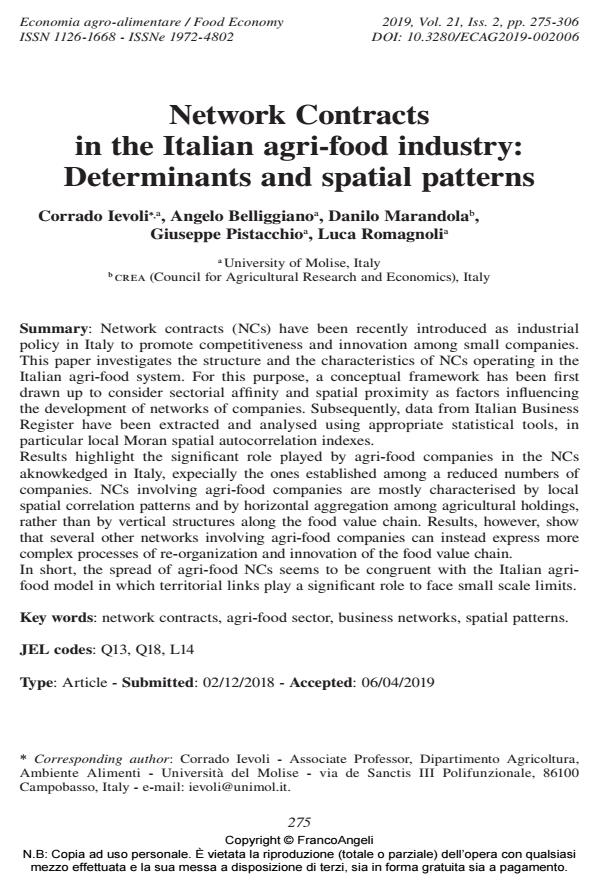Network Contracts in the Italian agri-food industry: Determinants and spatial patterns
Titolo Rivista ECONOMIA AGRO-ALIMENTARE
Autori/Curatori Corrado Ievoli, Angelo Belliggiano, Danilo Marandola, Giuseppe Pistacchio, Luca Romagnoli
Anno di pubblicazione 2019 Fascicolo 2019/2
Lingua Inglese Numero pagine 32 P. 275-306 Dimensione file 237 KB
DOI 10.3280/ECAG2019-002006
Il DOI è il codice a barre della proprietà intellettuale: per saperne di più
clicca qui
Qui sotto puoi vedere in anteprima la prima pagina di questo articolo.
Se questo articolo ti interessa, lo puoi acquistare (e scaricare in formato pdf) seguendo le facili indicazioni per acquistare il download credit. Acquista Download Credits per scaricare questo Articolo in formato PDF

FrancoAngeli è membro della Publishers International Linking Association, Inc (PILA), associazione indipendente e non profit per facilitare (attraverso i servizi tecnologici implementati da CrossRef.org) l’accesso degli studiosi ai contenuti digitali nelle pubblicazioni professionali e scientifiche.
Network contracts (NCs) have been recently introduced as industrial policy in Italy to promote competitiveness and innovation among small companies. This paper investigates the structure and the characteristics of NCs operating in the Italian agri-food system. For this purpose, a conceptual framework has been first drawn up to consider sectorial affinity and spatial proximity as factors influencing the development of networks of companies. Subsequently, data from Italian Business Register have been extracted and analysed using appropriate statistical tools, in particular local Moran spatial autocorrelation indexes. Results highlight the significant role played by agri-food companies in the NCs aknowkedged in Italy, expecially the ones established among a reduced numbers of companies. NCs involving agri-food companies are mostly characterised by local spatial correlation patterns and by horizontal aggregation among agricultural holdings, rather than by vertical structures along the food value chain. Results, however, show that several other networks involving agri-food companies can instead express more complex processes of re-organization and innovation of the food value chain. In short, the spread of agri-food NCs seems to be congruent with the Italian agrifood model in which territorial links play a significant role to face small scale limits.
Parole chiave:Network contracts, agri-food sector, business networks, spatial patterns.
Jel codes:Q13, Q18, L14
- Information and Communication Infrastructures and New Business Models in Rural Areas: The Case of Molise Region in Italy Corrado Ievoli, Angelo Belliggiano, Danilo Marandola, Pierluigi Milone, Flaminia Ventura, in European Countryside /2019 pp.475
DOI: 10.2478/euco-2019-0027 - Rural-Urban Linkages: Regional Financial Business Services’ Integration into Chilean Agri-Food Value Chains Eduardo Rodrigues Sanguinet, Francisco de Borja García-García, in Sustainability /2023 pp.10863
DOI: 10.3390/su151410863 - Neo-Endogenous Rural Development in Favor of Organic Farming: Two Case Studies from Italian Fragile Areas Angelo Belliggiano, Alberto Sturla, Marco Vassallo, Laura Viganò, in European Countryside /2020 pp.1
DOI: 10.2478/euco-2020-0001 - Supply chain networks in the Armenian agribusiness: Setting a benchmark Jon H. Hanf, Silva Atoyan, Linda Bitsch, Taras Gagalyuk, in ECONOMIA AGRO-ALIMENTARE 2/2019 pp.359
DOI: 10.3280/ECAG2019-002010 - The Impact of Instrumental Stakeholder Management on Blockchain Technology Adoption Behavior in Agri-Food Supply Chains Michael Paul Kramer, Linda Bitsch, Jon H. Hanf, in Journal of Risk and Financial Management /2021 pp.598
DOI: 10.3390/jrfm14120598 - Blockchain and Its Impacts on Agri-Food Supply Chain Network Management Michael Paul Kramer, Linda Bitsch, Jon Hanf, in Sustainability /2021 pp.2168
DOI: 10.3390/su13042168
Corrado Ievoli, Angelo Belliggiano, Danilo Marandola, Giuseppe Pistacchio, Luca Romagnoli, Network Contracts in the Italian agri-food industry: Determinants and spatial patterns in "ECONOMIA AGRO-ALIMENTARE" 2/2019, pp 275-306, DOI: 10.3280/ECAG2019-002006